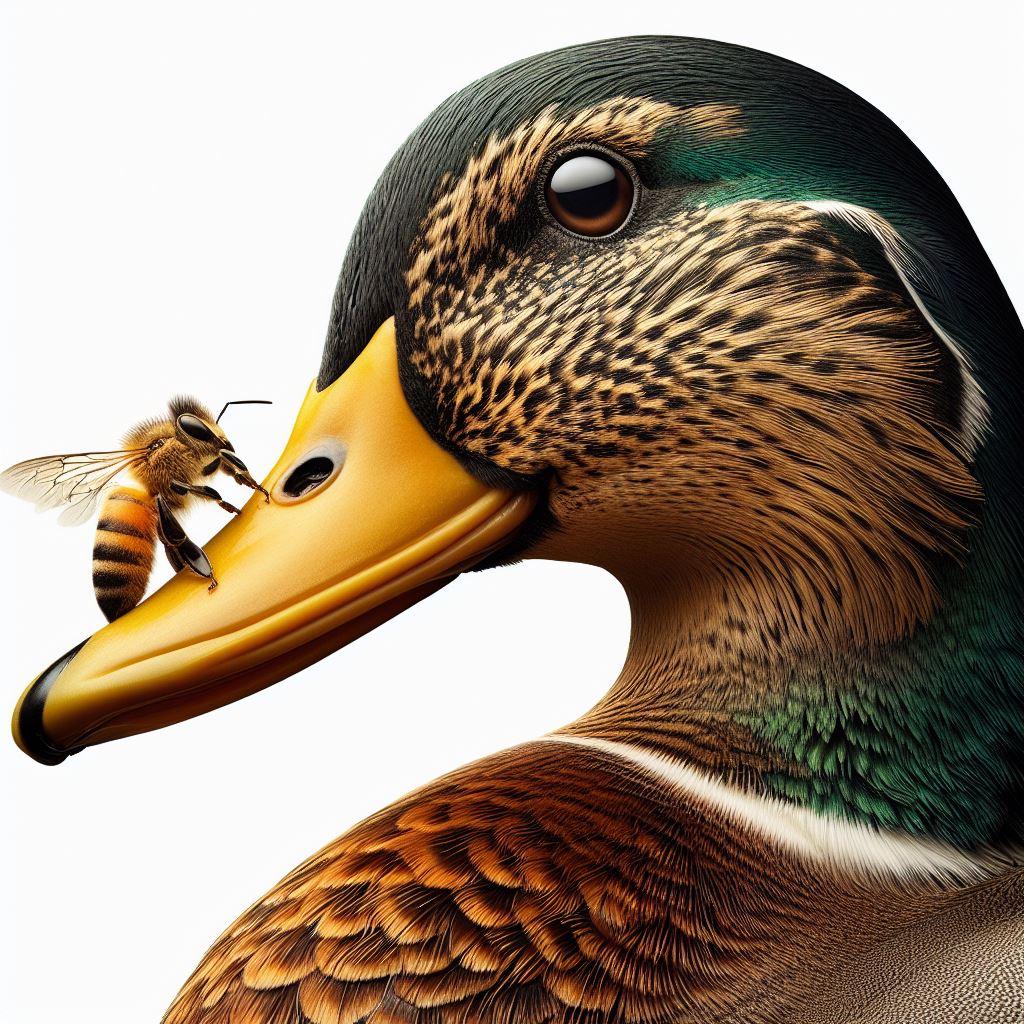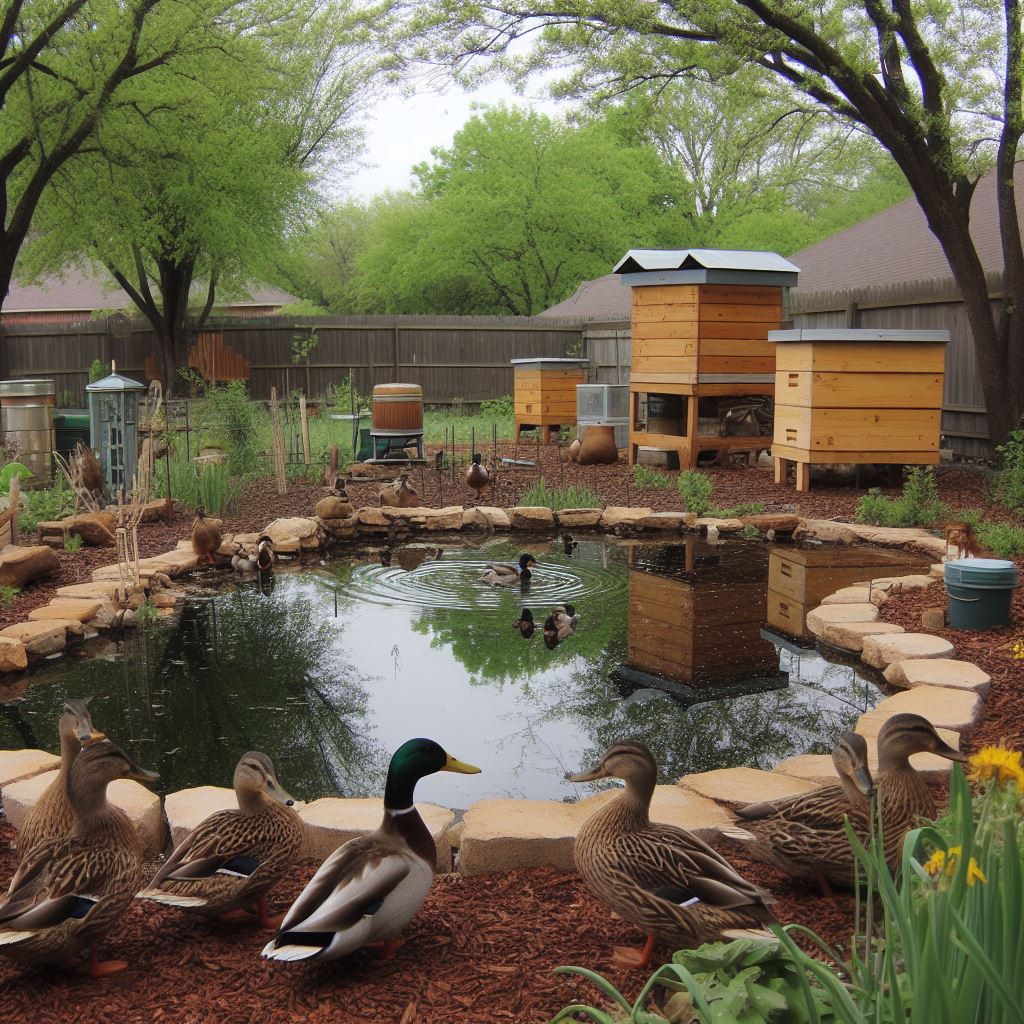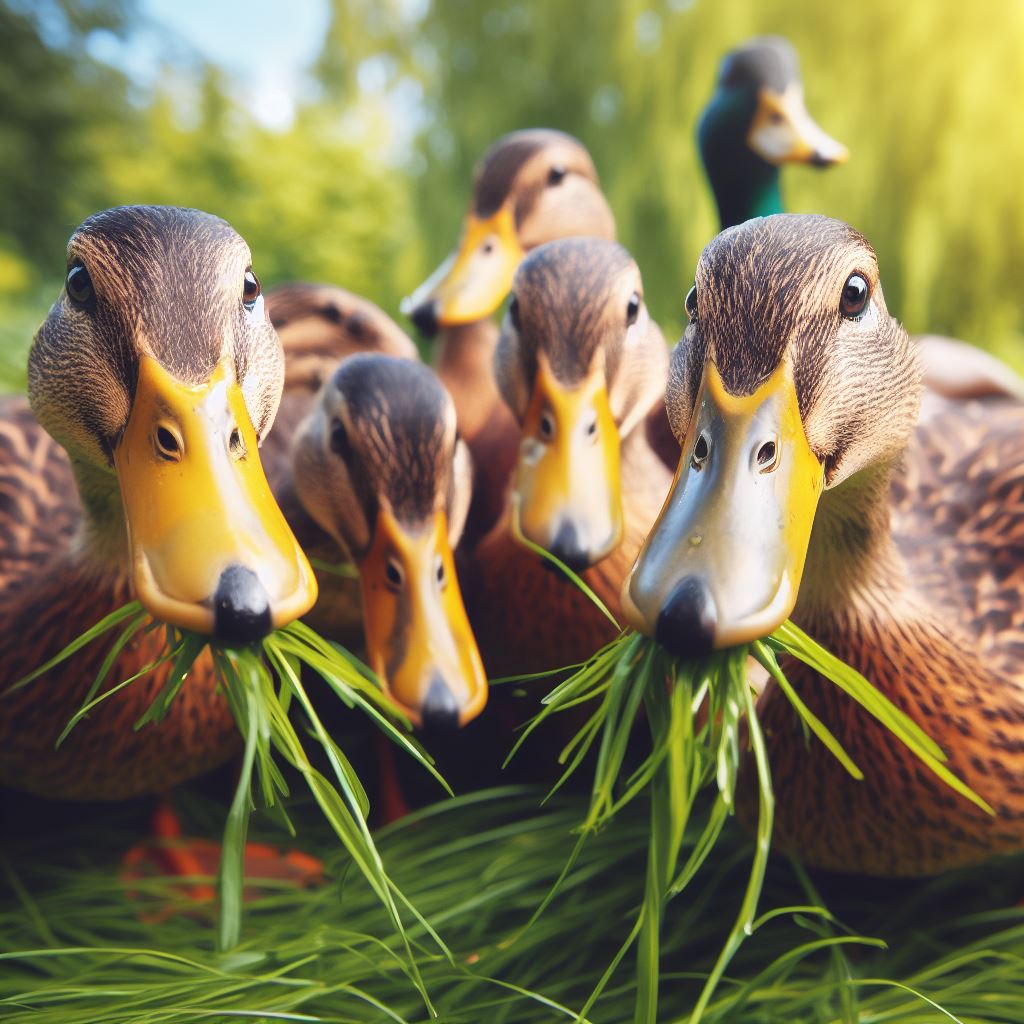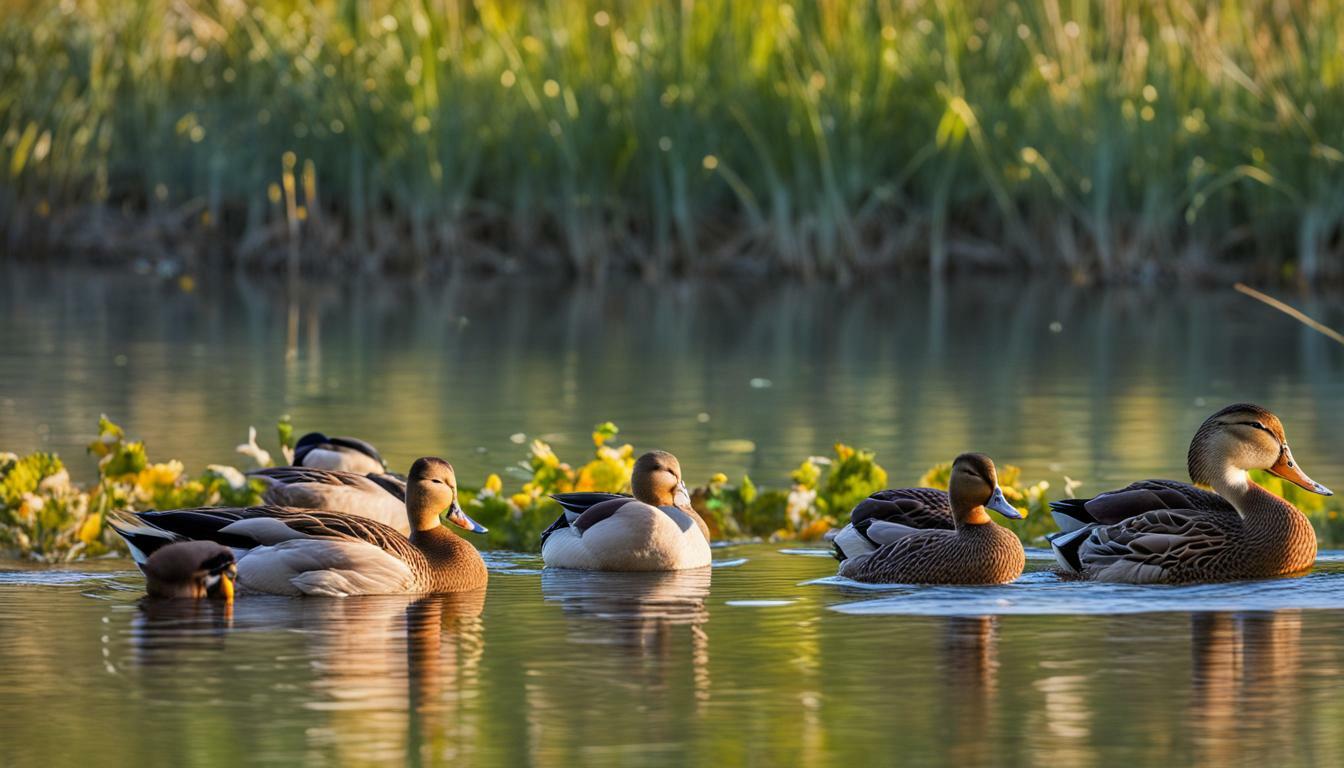Do Ducks Eat Bees? The Surprising Answer

Table of content:
- An Overview of Ducks and Their Diets
- The Basics of Bees and Their Role in Nature
- Do Bees Ever Become Prey for Ducks?
- Indirect Relationships Between Ducks and Bees
- Can Ducks Eat Honey and Pollen?
- What Other Insects Do Ducks Consume?
- What Other Components Makeup Duck Diets?
- Do Bees Help Sustain Healthy Duck Habitats?
- Conclusion: Can Ducks Eat Bees?
Ducks and bees – two classic staples of ponds, lakes, rivers and other wetland areas. But do these iconic creatures interact? Do ducks eat bees? Or do bees help sustain ducks in some way? This article will explore the diets of various duck species and examine if and how bees play a role.
An Overview of Ducks and Their Diets
There are over 120 different species of ducks that can be found worldwide. The most common duck species, including the mallard, wood duck, mandarin duck and muscovy duck, thrive in wetland habitats like marshes, streams, rivers and small ponds.
Ducks have specialized bills that allow them to filter food from water. Their diverse diets consist of:
- Aquatic plants and algae
- Aquatic insects and larvae
- Seeds and vegetation
- Small fish, frogs, tadpoles and other aquatic creatures
Some ducks are dabbling ducks that feed near the surface, while others are diving ducks that catch prey underwater. Perching ducks will even climb out of the water to find food.
So in short – ducks eat a varied mix of plant and animal matter. But could bees be on the menu? Let’s learn more about bees first.
 The Basics of Bees and Their Role in Nature
The Basics of Bees and Their Role in Nature
There are over 20,000 species of bees globally. The most well-known ones include:
- Honey bees – live communally in managed hives led by a queen
- Bumble bees – nest in small colonies with queens
- Carpenter bees – solitary bees that nest in wood
Bees play a crucial role as pollinators in most ecosystems. As they travel from flower to flower gathering pollen and nectar to make honey, they distribute pollen grains and facilitate plant reproduction.
Some key facts about bees:
- Build nests and hives to store their larvae and honey
- Consume nectar and pollen from flowering plants
- Unintentional pollinators for many plant species
- Can deliver painful or even fatal stings using their stingers
Now that we’ve covered some duck and bee basics, let’s analyze the scenarios where they intersect.
Do Bees Ever Become Prey for Ducks?
So can ducks directly consume bees as a food source? It’s quite unlikely for a few reasons:
- Bees actively use their stingers to defend themselves and their hives from predators. Even with their thick plumage, accumulating multiple stings could be harmful to ducks.
- Bees do not naturally occur in high enough densities near lakes or ponds to attract ducks as predators. Their hives and nesting areas are usually terrestrial.
- While bees could occasionally end up in the water after dying, they would likely only represent an incidental supplemental protein source versus a primary food target.
That said, duck eggs and ducklings in ground nests could face danger from some bee species foraging for food. But in most cases, bees steer clear of tangling directly with adult ducks.
Indirect Relationships Between Ducks and Bees
However, some indirect relationships can still develop between ducks and bees:
Pollen Transport
- As bees collect protein-rich pollen for their hives, pollen grains may inadvertently get transported to lakes and ponds.
- Ducks filtering food from the water consume these pollen grains as a supplemental source of nutrients.
Habitat Overlap
- Bees rely on nectar from aquatic and wetland plants like marsh milkweed, blue vervain and meadow beauty that also sustain ducks.
- Protecting bee populations helps preserve the diverse plant food sources ducks rely on.
Backyard Duck Ponds
- Artificial backyard duck ponds situated near bee apiaries can incidentally attract bees looking for water sources. But they likely avoid directly interacting.
So while ducks and bees don’t directly compete for the same food resources, they both play integral roles in sustaining the health of shared wetland ecosystems. Their indirect connections help illustrate the complex networks in nature.
Now that we’ve weighed the major evidence on whether ducks directly consume bees, let’s analyze some related questions in more detail:
Can Ducks Eat Honey and Pollen?
As productive pollinators, bees produce copious honey and pollen stores in their nests and hives. Containing carbohydrates, protein, vitamins and minerals, these substances are incredibly nutritious.
- Honey – Made from concentrated plant nectar, honey provides a dense source of natural sugars.
- Pollen – Bees collect this protein and fat-rich dust to feed their larvae.
These nutritious bee products will inevitably find their way into ponds and wetlands. But can ducks make use of them?
As opportunistic omnivores, mallards and other duck species will sample many food types to meet their dietary needs. Analysis of wild duck guts and feces has revealed traces of pollen and honey suggesting ducks gain marginal nutritional value from bee products.
However, pollen and honey form a very small fractional component of overall duck diets. While ducks can ingest honey and pollen incidentally, they lack efficient adaptations to seek out and harvest the amounts bees carefully produce.
What Other Insects Do Ducks Consume?
While bees may largely avoid duck dinner plates, many other insects commonly succumb to their versatile bills. Here are some of the most prominent insect groups consumed by different duck species:
| Insect Group | Types | Duck Species |
|---|---|---|
| Beetles | aquatic beetles, rove beetles, water scavenger beetles | Mallards, wood ducks, diving ducks |
| Flies | mosquitoes, midges, black flies, hoverflies | Most ducks |
| Butterflies & Moths | caterpillars and larvae | Dabbling ducks, teals |
| Damselflies & Dragonflies | nymphs and adults | Diving ducks |
| Spiders | Various wetland and water spiders | Most duck species |
As this table shows, the duck diet contains a broad diversity of insects – but bees are almost always off the menu!
What Other Components Makeup Duck Diets?
While insects supplement their nutrition, ducks consume a wide variety of food types. Here are some other common components:
Seeds/Grains: Cereal grains like wheat, rice, oats, corn and barley are readily consumed when available. These offer essential carbohydrates.
Vegetation: Dabbling ducks are like feathered grazing lawnmowers! They trim and nibble vegetation from pond edges and wetland plants growing underwater or on the surface. These provide nutrients and cellulose.
Fruits/Nuts: During fall migrations, certain duck species gorge on energy-rich fruits and nuts like acorns, grapes, olives and figs. These boost fat reserves before migrating and breeding.
Amphibians & Fish: Protein-packed frogs, tadpoles and small fish get preyed on by diving ducks and mergansers that catch live animals. Their high protein content aids duckling growth.
As generalist feeders, most duck species sample various food sources based on seasonal and regional availability. But meat bees never seem to make the rotating menu!
Do Bees Help Sustain Healthy Duck Habitats?
While bees don’t directly interact with ducks as prey or food competitors, preserving bee biodiversity has key benefits for duck habitats:
Pollination – Bees pollinate the seeds, fruits, vegetables and flowering aquatic plants that attract ducks. Loss of bees could indirectly impact food chain integrity.
Biodiversity – Complex ecosystems with vast biodiversity intrinsically support more duck species than degraded habitats lacking complexity. Protecting pollinators helps preserve habitat diversity.
Backyard Ponds – Artificial backyard duck ponds situated near gardens and flower beds benefit from the cross-pollination services of visiting bees.
Therefore, conservation efforts aimed at restoring bee populations intrinsically also help ensure the availability of critical wetland habitats needed to sustain duck biodiversity around the world. The fates of bees and ducks are subtly yet closely intertwined even if they don’t directly compete for the same food resources.
Conclusion: Can Ducks Eat Bees?
After reviewing all the evidence and connections between ducks and bees, what conclusions can be drawn? Here are the key summary takeaways:
- Bees and their hives actively avoid areas frequented by ducks as their feeding territories don’t overlap much. Bees also can deliver painful stings that deter potential duck predators.
- Ducks do not directly seek out bees or their nutritious honey/pollen reserves as substantial food sources. Only trace amounts get incidentally ingested.
- However, bees help sustain floral biodiversity in wetland areas that provide ducks with forage vegetation and seeds. Their pollination services are vital for preserving duck habitat ecosystems.
- Conserving bee populations intrinsically helps protect duck biodiversity as both rely on healthy wetland habitats with vibrant plant biodiversity.
- While ducks and bees don’t directly compete or interact, saving bees and the services they provide is essential for ensuring the many species of ducks around the world continue thriving for generations.
So in the end, do ducks eat bees? While accidental minor consumption occurs, clear evidence shows bees play a subtler yet equally vital role in sustaining the wetland habitats so critical to ducks worldwide. Preserving biodiversity requires maintaining delicate yet complex balances.
I hope this thorough exploration into the connections of ducks and bees was an insightful read! Let me know in the comments if you have any other lingering questions.
Welcome. I’m Adreena Shanum, the proud owner of this website, and I am incredibly passionate about animals, especially poultry. I founded adreenapets.com as a labor of love, stemming from my desire to share my knowledge and experiences with poultry enthusiasts worldwide.




